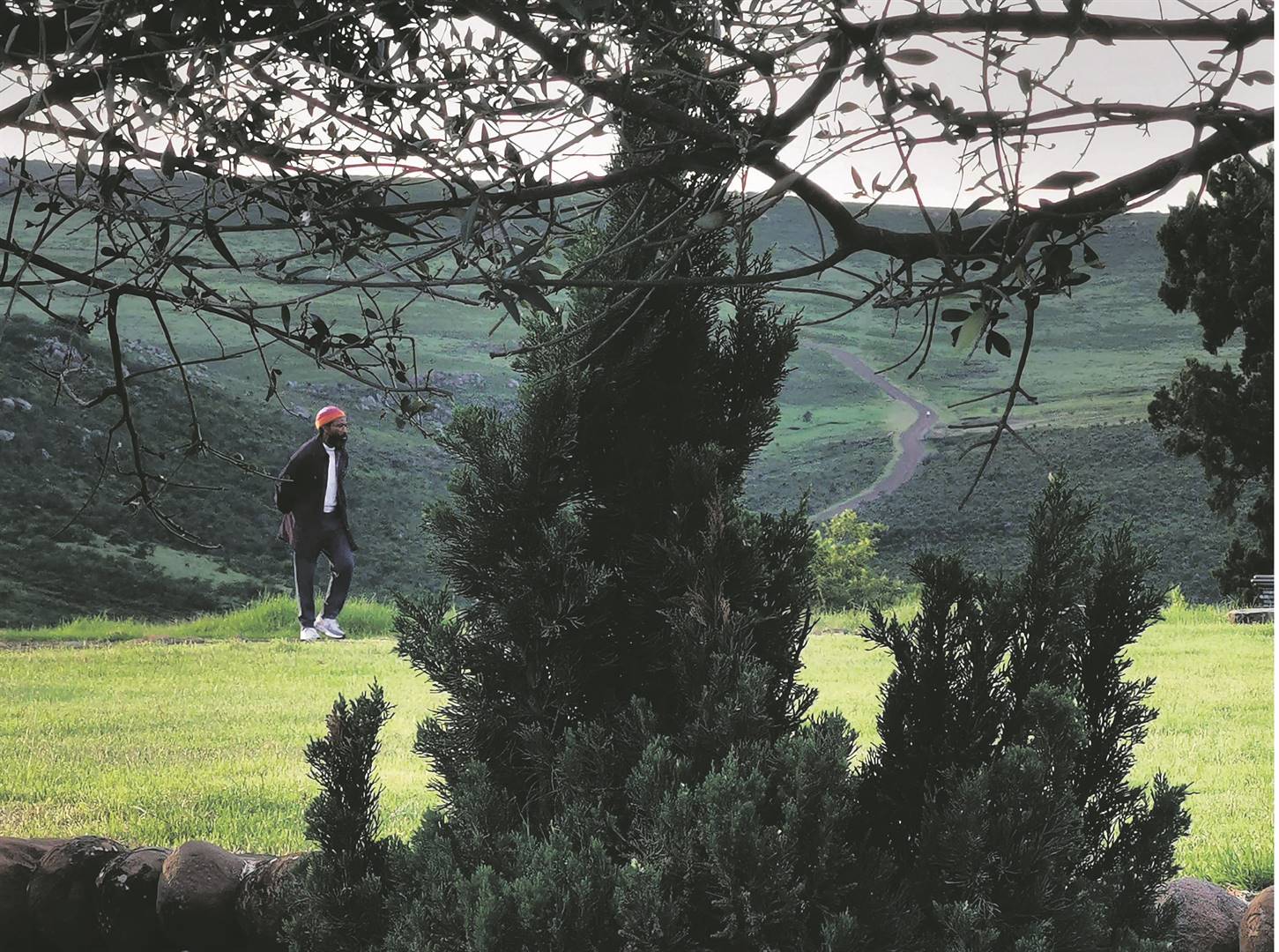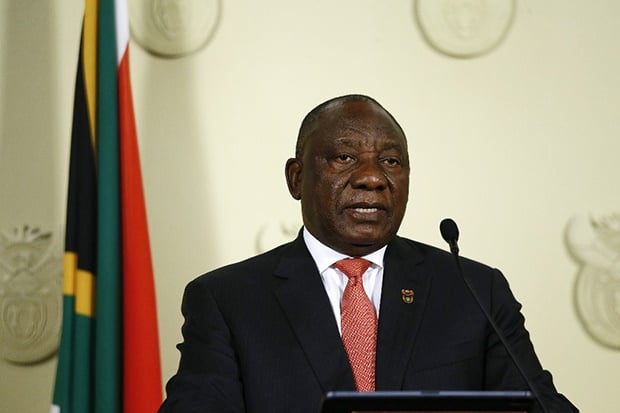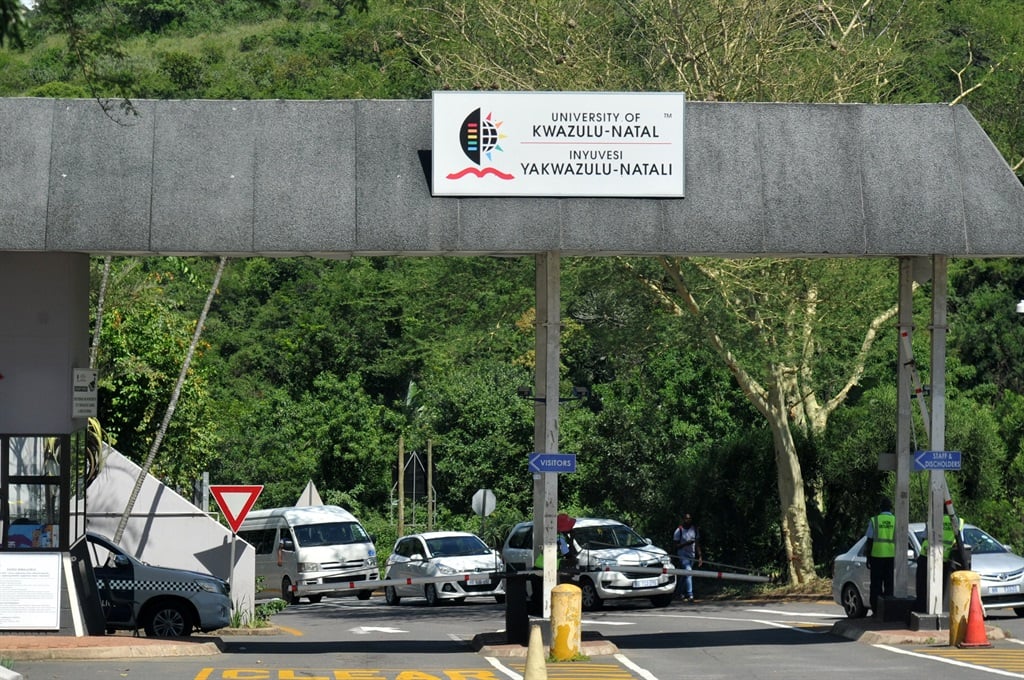Airports Company SA (Acsa) intensified measures at Cape Town International Airport on March 12 2020 by putting up notice boards and stickers to prevent the spread of the coronavirus.
Image: ESA ALEXANDER/SUNDAY TIMES
Health minister Zweli Mkhize and justice minister Ronald Lamola have confirmed that if the coronavirus situation deteriorates, the South African government may consider declaring a state of emergency.
A number of ministers who form part of government’s response to the virus addressed the media on Monday morning on the measures announced by Ramaphosa on Sunday evening.
The council will be meeting at least three times a week and will also consist of senior government officials who will be released from some of their responsibilities as government looks to arrest a wide scale outbreak in the country.
Mkhize and Lamola emphasised that the declaration of a national disaster was the first step to try contain the spread of the virus.
Lamola said that the disaster management act enabled the government to suspend or limit some of the rights of citizens enshrined in the constitution.
Ramaphosa announced that gatherings of more than 100 were now prohibited and schools will be closing.
Mkhize also explained the high risk that comes with local transmission.
“Once this infection spreads in taxis, trains, informal settlements, it will create a new dynamic. We will need to create quarantine facilities if necessary. It means some might have to move out their homes.”
Nearly 1,000 new cases in Spain in 24 hours
Spain has registered nearly 1,000 new Covid-19 infections over the past 24 hours, raising the total number of cases to 8,744, the health ministry said on Monday.
Over the same period, the number of deaths rose by nine to 297, the ministry’s emergencies coordinator Fernando Simon said.
The figure for new cases was lower than weekend numbers, when 2,000 infections were detected between Saturday and Sunday and the number of deaths rose by around 100. Of the total number, Madrid remains the worst-affected region, with 4,665 cases.
In order to rein in the virus, Spain has declared a state of alert, shutting all but essential services and ordering its population of 46-million people to stay at home. People are only authorised to go out to buy food or medicine, to go to work or to get medical treatment.
– AFP
Grade R pupil tests positive: Richards Bay school in lockdown
A Grade R pupil at Richards Bay Primary School in northern KwaZulu-Natal has tested positive for Covid-19.
Education MEC Kwazi Mshengu confirmed the school was on lockdown after 17 pupils in the same class began showing potential symptoms of infection.
“We can confirm one Grade R leaner from Richards Bay Primary tested positive. We understand her mother works at one of the banks and deals with the foreign exchange of money.”
Netcare warns against criminals claiming to test for coronavirus
In a press release, Netcare said it is aware that criminals are going to homes claiming to be from Netcare or Netcare 911, and saying that they are assisting the department of health with door-to-door screening for Covid-19.
It reiterated that staff members from the Netcare Group, including from Netcare hospitals, Netcare 911 or Medicross medical and dental centres, are not doing door-to-door Covid-19 screening.
Should someone arrive at your home or business premises claiming to do screening for the novel coronavirus, do not allow them onto the property and alert the SAPS.
Business supports Ramaphosa’s coronavirus plan
Organised business has pledged its full support for the measures announced by President Cyril Ramaphosa to combat Covid-19 and has called on its members to contain the virus.
“The president has made it clear what needs to be done, and we are all compelled to support him, as well as to reinforce the excellent leadership and management shown by health minister Zweli Mkhize and key health stakeholders such as the World Health Organisation,” said Sipho Pityana, president of Business Unity South Africa.
“We are urging our member organisations to ensure that the president’s measures are implemented as speedily as possible, and to increase awareness and positive action wherever possible. The president also referred to the potentially damaging impact on our economy that the Covid-19 virus will have. This will exacerbate the economic crisis we are already experiencing, and business will work with government and labour to pull resources and capacity together to mitigate the economic, health and social risks posed by the virus.”
Ghana closes schools, bans gatherings over coronavirus
Ghana on Monday closed all schools and universities and suspended public events to stop the spread of coronavirus as a string of African nations imposed tighter restrictions to stem the spread of the global pandemic.
President Nana Akufo-Addo announced in an address to the West African nation that the authorities were shutting schools and universities “until further notice”. Public gatherings — including conferences, religious services, sports matches and political rallies — have also been suspended for four weeks, he said.
Ghana on Sunday announced it would start barring entry to the country from Tuesday for any non-Ghanaian citizen or resident “who, within the last 14 days, has been to a country that has recorded at least 200 cases”.
— AFP
Liberia reports first coronavirus case
Liberia has recorded its first coronavirus case, a ministry official said on Monday.
“I can confirm that we have a case and we are managing it,” Chief Medical Officer Francis Kateh said. He did not provide any further details on the patient’s identity.
President George Weah is expected to make a speech later in the day.
— Reuters
Malaysia reports 125 new coronavirus cases
Malaysia reported 125 new coronavirus cases on Monday, with most linked to a religious gathering attended by about 16,000 people.
The new cases bring the total tally to 553 in the country, which remains the worst affected in Southeast Asia.
— Reuters
Iran says coronavirus kills member of top clerical body
Iran’s coronavirus outbreak on Monday killed a member of the clerical body that appoints the supreme leader, state media said, taking the death toll among serving and ex-officials to at least 12.
Ayatollah Hashem Bathayi Golpayegani, who was 78, died two days after testing positive for the Covid-19 disease and being hospitalised, state news agency IRNA reported.
The official represented Tehran in the Assembly of Experts, an 88-strong body of clerics that appoints and monitors Iran’s supreme leader. At least 12 Iranian politicians and officials, both sitting and former, have now died of the illness, and 13 more have been infected and are either in quarantine or being treated.

 President Cyril Ramaphosa has announced a number of “drastic” measures – including limiting gatherings to 100 people – to deal with the Covid-19 coronavirus.
President Cyril Ramaphosa has announced a number of “drastic” measures – including limiting gatherings to 100 people – to deal with the Covid-19 coronavirus. Universities in Gauteng, Cape Town and the KwaZulu-Natal are putting in place contingency plans as the confirmed cases of the Covid-19 coronavirus continue to rise.
Universities in Gauteng, Cape Town and the KwaZulu-Natal are putting in place contingency plans as the confirmed cases of the Covid-19 coronavirus continue to rise.